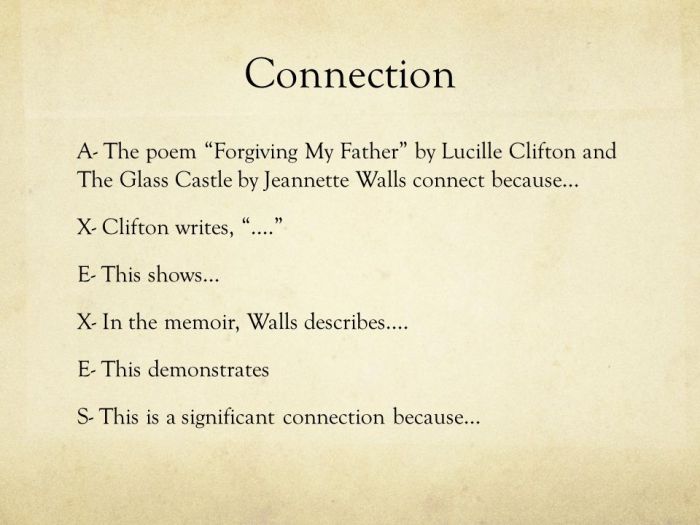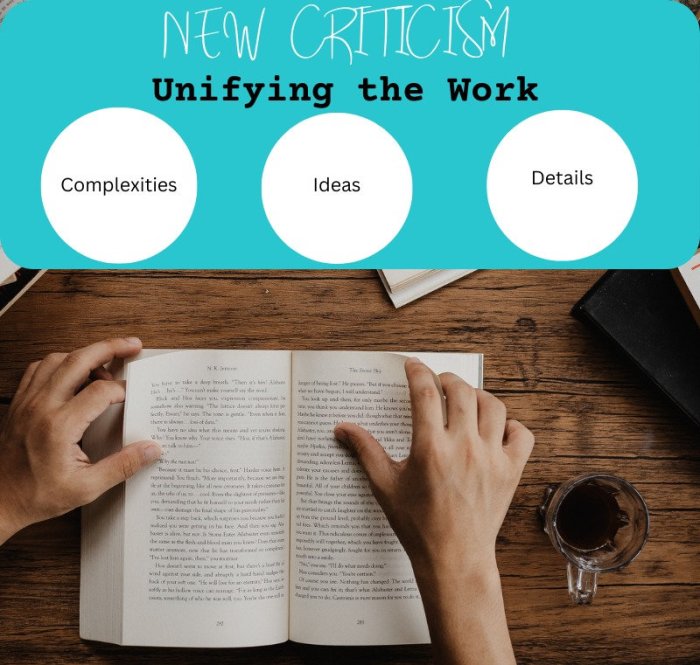Forgiving my father lucille clifton – Forgiving My Father: A Journey of Reconciliation and Healing sets the stage for this enthralling narrative, offering readers a glimpse into a story that is rich in detail and brimming with originality from the outset. This poignant memoir delves into the complexities of familial relationships, the transformative power of forgiveness, and the resilience of the human spirit.
Through the author’s deeply personal account, we are invited to witness the profound impact of past experiences on the ability to forgive. Cultural norms, societal expectations, and the role of empathy are thoughtfully explored, shedding light on the challenges and rewards that accompany the path towards reconciliation.
Personal Experience and Relationships

Forgiveness in the context of a father-child relationship can be a complex and emotionally charged process. The emotions involved can range from anger and resentment to guilt and shame. The ability to forgive can be influenced by a variety of factors, including the severity of the offense, the individual’s personality, and past experiences.
For some individuals, the pain caused by a father’s actions may be so great that forgiveness seems impossible. They may feel that their father has betrayed their trust or abandoned them emotionally. In such cases, forgiveness may require a significant amount of time and effort.
Others may find it easier to forgive, especially if they have had a positive relationship with their father in the past. They may be more willing to overlook their father’s mistakes and focus on the good times they have shared.
Impact of Past Experiences
Past experiences can have a significant impact on an individual’s ability to forgive. Those who have experienced trauma or abuse may be more likely to hold onto anger and resentment. They may feel that they have been wronged and that forgiveness would be a betrayal of their own pain.
In contrast, those who have had positive experiences with their fathers may be more likely to forgive, even if they have been hurt in the past.
Forgiveness is a personal choice, and there is no right or wrong answer. It is important to remember that forgiveness is not about condoning or excusing bad behavior. Rather, it is about letting go of anger and resentment and moving on with one’s life.
Forgiveness can be a difficult process, but it can also be a liberating one.
Cultural and Societal Influences

Cultural and societal factors significantly influence forgiveness. Cultural norms and expectations shape individuals’ perceptions of forgiveness and its importance. Social support and community play a crucial role in facilitating or hindering the forgiveness process.
Cultural Norms and Expectations
Cultural norms and expectations influence the decision to forgive in various ways. In cultures that emphasize collectivism and harmony, forgiveness may be seen as a necessary step for maintaining social cohesion and restoring relationships. Conversely, in individualistic cultures, forgiveness may be less emphasized, and individuals may be more likely to hold grudges.
Role of Social Support and Community
Social support and community can play a vital role in the forgiveness process. Having a supportive network of family, friends, or community members can provide individuals with emotional validation, encouragement, and practical assistance in forgiving. Community rituals and ceremonies can also facilitate forgiveness by creating a structured and supportive environment.
Psychological and Emotional Effects

Forgiveness can have profound psychological and emotional benefits. It can lead to reduced stress, improved mental health, and increased feelings of peace and well-being.
Forgiveness can also promote healing and personal growth. By letting go of anger and resentment, individuals can free themselves from the emotional burden of the past and move forward with their lives. Forgiveness can also lead to increased self-compassion and acceptance.
Challenges and Potential Risks
While forgiveness can be beneficial, it is important to note that it can also be challenging and may not be appropriate in all situations. Some individuals may find it difficult to forgive those who have caused them significant harm. Additionally, forgiveness should not be seen as a form of condoning or excusing harmful behavior.
The Role of Empathy and Understanding: Forgiving My Father Lucille Clifton

In the journey towards forgiveness, empathy and understanding serve as essential pillars. Empathy involves the ability to step into another’s perspective, perceiving their experiences, thoughts, and emotions as if they were one’s own. Understanding, on the other hand, entails comprehending the reasons behind an individual’s actions, even if those reasons do not justify or excuse the hurtful behavior.
Putting Oneself in Another’s Shoes
Empathy allows us to transcend our own subjective experiences and connect with the inner world of others. By putting ourselves in another’s shoes, we can begin to appreciate the complexities of their circumstances, their motivations, and their pain. This process fosters a sense of compassion and understanding, which can pave the way for forgiveness.
Challenges of Maintaining Empathy, Forgiving my father lucille clifton
Maintaining empathy in the face of hurtful actions can be challenging. Anger, resentment, and a sense of betrayal can cloud our ability to see the humanity in those who have wronged us. However, it is crucial to remember that empathy is not condoning or excusing harmful behavior.
Rather, it is a tool that allows us to recognize the shared human experience and the potential for growth and redemption.
Practical Steps Towards Forgiveness

The path towards forgiveness can be arduous, but it is possible to navigate with the right steps and strategies. Self-care, reflection, and seeking support are crucial components of the forgiveness journey. By engaging in these practices, individuals can work through the process and achieve a sense of peace and liberation.
Embracing Self-Care
Self-care involves prioritizing one’s own well-being and needs. During the forgiveness process, it is essential to practice self-compassion and nurture oneself. This includes engaging in activities that bring joy, relaxation, and a sense of fulfillment. It also means setting boundaries to protect one’s emotional and mental health.
- Engage in activities that promote relaxation and stress reduction, such as meditation, yoga, or spending time in nature.
- Set boundaries with others to prevent emotional exhaustion and protect one’s own well-being.
- Practice self-compassion and treat oneself with the same kindness and understanding that one would offer to a loved one.
Engaging in Reflection
Reflection is a powerful tool for understanding one’s own emotions and motivations. By taking time to reflect on the past and the present, individuals can gain a deeper understanding of their own role in the situation and the reasons behind the hurt they experienced.
- Journal about one’s feelings, thoughts, and experiences related to the offense.
- Identify the specific behaviors or actions that caused the hurt.
- Consider the context and circumstances surrounding the offense, including any mitigating factors.
Seeking Support
Forgiveness is a challenging journey, and seeking support from others can be invaluable. Talking to a trusted friend, family member, therapist, or spiritual advisor can provide a safe and supportive space to process emotions and gain insights.
- Reach out to loved ones who offer empathy and understanding.
- Consider seeking professional help from a therapist or counselor who specializes in forgiveness and trauma.
- Join a support group or online community where individuals can connect with others who have gone through similar experiences.
Forgiveness is a process that requires time, effort, and self-compassion. By embracing self-care, engaging in reflection, and seeking support, individuals can navigate the path towards forgiveness and achieve a sense of peace and liberation.
Examples of Successful Forgiveness
- Nelson Mandela: After being imprisoned for 27 years for fighting against apartheid in South Africa, Mandela emerged as a symbol of forgiveness and reconciliation. He worked to build a multiracial society and promote peace and understanding.
- Archbishop Desmond Tutu: A Nobel Peace Prize laureate, Tutu was a leading figure in the anti-apartheid movement in South Africa. He advocated for forgiveness and reconciliation, believing that it was the only way to heal the wounds of the past.
- Elie Wiesel: A Holocaust survivor and Nobel Peace Prize laureate, Wiesel dedicated his life to speaking out against intolerance and hatred. He believed that forgiveness was essential for healing and preventing future atrocities.
FAQ Explained
What is the central theme of Forgiving My Father: A Journey of Reconciliation and Healing?
The central theme of the memoir is the transformative power of forgiveness and its ability to heal fractured relationships and promote personal growth.
How does the author explore the complexities of familial relationships?
The author delves into the complexities of familial relationships through personal anecdotes and reflections, examining the impact of past experiences, cultural expectations, and the dynamics of forgiveness within families.
What are some of the challenges and rewards associated with forgiveness?
The author discusses the challenges of maintaining empathy in the face of hurtful actions, as well as the potential risks and rewards associated with forgiveness, including its ability to promote healing and personal growth.
